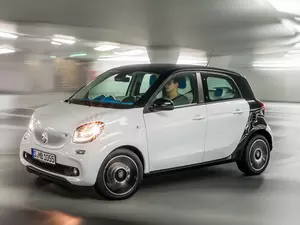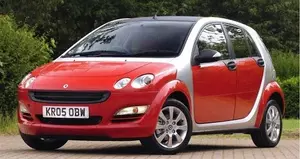
| Vehicle | Curb weight | Difference from world's smallest | Weight to power ratio | 0—60 mph acceleration ratio | Consumption ratio |
|---|---|---|---|---|---|
| 0.9 |
920 kg / 2029 lbs |
495 kg (1092 lbs) heavier | 10 kg to 1 hp | 87 kg/s (192 lbs/s) |
214 kg/L (472 lbs/L) |
| 1.0 |
900 kg / 1985 lbs |
475 kg (1048 lbs) heavier | 13 kg to 1 hp | 60 kg/s (132 lbs/s) |
214 kg/L (472 lbs/L) |
| Brabus 0.9 |
1095 kg / 2414 lbs |
670 kg (1477 lbs) heavier | 10 kg to 1 hp | 110 kg/s (243 lbs/s) |
238 kg/L (525 lbs/L) |
| 17.6 kWh |
1100 kg / 2426 lbs |
675 kg (1489 lbs) heavier | 13 kg to 1 hp | 91 kg/s (201 lbs/s) | - |
| Vehicle | 0.9 |
|---|---|
| Curb weight |
920 kg / 2029 lbs |
| Difference from world's smallest | 495 kg (495 lbs) heavier |
| Weight to power ratio | 10 kg to 1 hp |
| 0—60 mph acceleration ratio | 87 kg/s (192 lbs/s) |
| Consumption ratio |
214 kg/L (472 lbs/L) |
| Vehicle | 1.0 |
| Curb weight |
900 kg / 1985 lbs |
| Difference from world's smallest | 475 kg (475 lbs) heavier |
| Weight to power ratio | 13 kg to 1 hp |
| 0—60 mph acceleration ratio | 60 kg/s (132 lbs/s) |
| Consumption ratio |
214 kg/L (472 lbs/L) |
| Vehicle | Brabus 0.9 |
| Curb weight |
1095 kg / 2414 lbs |
| Difference from world's smallest | 670 kg (670 lbs) heavier |
| Weight to power ratio | 10 kg to 1 hp |
| 0—60 mph acceleration ratio | 110 kg/s (243 lbs/s) |
| Consumption ratio |
238 kg/L (525 lbs/L) |
| Vehicle | 17.6 kWh |
| Curb weight |
1100 kg / 2426 lbs |
| Difference from world's smallest | 675 kg (675 lbs) heavier |
| Weight to power ratio | 13 kg to 1 hp |
| 0—60 mph acceleration ratio | 91 kg/s (201 lbs/s) |
| Consumption ratio | - |

| Vehicle | Curb weight | Difference from world's smallest | Weight to power ratio | 0—60 mph acceleration ratio | Consumption ratio |
|---|---|---|---|---|---|
| 1.1i |
965 kg / 2128 lbs |
540 kg (1191 lbs) heavier | 13 kg to 1 hp | 76 kg/s (168 lbs/s) |
182 kg/L (401 lbs/L) |
| 1.0i |
965 kg / 2128 lbs |
540 kg (1191 lbs) heavier | 15 kg to 1 hp | 67 kg/s (148 lbs/s) |
179 kg/L (395 lbs/L) |
| 1.5 cdi |
965 kg / 2128 lbs |
540 kg (1191 lbs) heavier | 10 kg to 1 hp | 97 kg/s (214 lbs/s) |
210 kg/L (463 lbs/L) |
| 1.3i |
965 kg / 2128 lbs |
540 kg (1191 lbs) heavier | 10 kg to 1 hp | 94 kg/s (207 lbs/s) |
166 kg/L (366 lbs/L) |
| 1.5i Brabus |
965 kg / 2128 lbs |
540 kg (1191 lbs) heavier | 5 kg to 1 hp | 146 kg/s (322 lbs/s) |
142 kg/L (313 lbs/L) |
| Vehicle | 1.1i |
|---|---|
| Curb weight |
965 kg / 2128 lbs |
| Difference from world's smallest | 540 kg (540 lbs) heavier |
| Weight to power ratio | 13 kg to 1 hp |
| 0—60 mph acceleration ratio | 76 kg/s (168 lbs/s) |
| Consumption ratio |
182 kg/L (401 lbs/L) |
| Vehicle | 1.0i |
| Curb weight |
965 kg / 2128 lbs |
| Difference from world's smallest | 540 kg (540 lbs) heavier |
| Weight to power ratio | 15 kg to 1 hp |
| 0—60 mph acceleration ratio | 67 kg/s (148 lbs/s) |
| Consumption ratio |
179 kg/L (395 lbs/L) |
| Vehicle | 1.5 cdi |
| Curb weight |
965 kg / 2128 lbs |
| Difference from world's smallest | 540 kg (540 lbs) heavier |
| Weight to power ratio | 10 kg to 1 hp |
| 0—60 mph acceleration ratio | 97 kg/s (214 lbs/s) |
| Consumption ratio |
210 kg/L (463 lbs/L) |
| Vehicle | 1.3i |
| Curb weight |
965 kg / 2128 lbs |
| Difference from world's smallest | 540 kg (540 lbs) heavier |
| Weight to power ratio | 10 kg to 1 hp |
| 0—60 mph acceleration ratio | 94 kg/s (207 lbs/s) |
| Consumption ratio |
166 kg/L (366 lbs/L) |
| Vehicle | 1.5i Brabus |
| Curb weight |
965 kg / 2128 lbs |
| Difference from world's smallest | 540 kg (540 lbs) heavier |
| Weight to power ratio | 5 kg to 1 hp |
| 0—60 mph acceleration ratio | 146 kg/s (322 lbs/s) |
| Consumption ratio |
142 kg/L (313 lbs/L) |